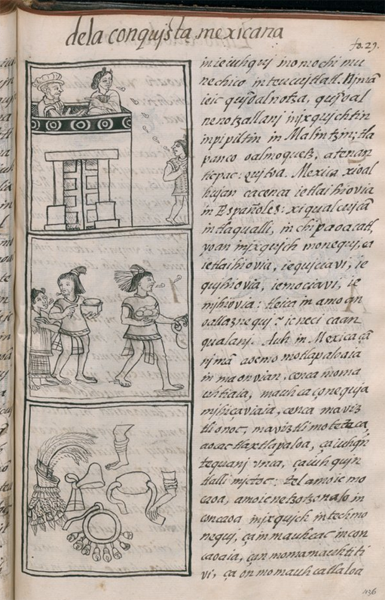Folio 29 recto
Translations and Transcriptions
Spanish Translation
[Translation of the Nahuatl into Spanish by Fr. Bernardino de Sahagún; transcription of the Spanish (left-hand column) by James Lockhart:] [f. 29r., tres dibujos; sin texto en español]
English Translation
[Translation of the Nahuatl (right-hand column) by James Lockhart:] when the collection of all the gold was completed, thereupon Marina summoned to her, had summoned, all the noblemen. She stood on a flat roof, on a roof parapet, and said, “Mexica, come here, for the Spaniards are suffering greatly. Bring food, fresh water, and all that is needed, for they are suffering travail, are tired, fatigued, weary, and exhausted. Why is it you do not want to come? It is a sign that you are angry.” But the Mexica no longer at all dared to go there. They were greatly afraid; they were limp with fear; they were taken aback. Fear greatly prevailed; it spread about. No one dared come out. It was as though a wild beast were loose, as though it were the deep of night. Yet there was not for that reason a halt or hesitation in delivering everything [the Spaniards] needed, but they delivered it fearfully, they went in fear, they ran in fear as they went to deliver it. And when they had spilled it on the ground, everyone came running back in a flash, panting and trembling. [Translation of the Spanish (left-hand column) by James Lockhart:] (intentionally blank)
Analytic Transcription
[Transcription of the Nahuatl (right-hand column) by James Lockhart:] [f. 29r.] in ie iuhqui in o mochi munechico inteucuitlatl. Nimā ie ic quīoalnotza, quīoalnenotzallani in ixquichtin in pipiltin in Malintzin: tlapanco oalmoquetz,atenanticpac: Quitoa. Mexica xioalhuian ca cenca ie tlaihiovia in Españoles: xiqualcuicā* in tlaqualli, in chipaoac atl, yoan in ixquich monequi, ca ie tlaihiovia,ie quiciavi, ie quihiovia, ie mociavi, ie mihiovia: tleicain amo anoallaznequi? ic neci ca anqualani. Auh in Mexica çā nimā aocmo motlapaloaia in ma onvian, cenca momauhtiaia, mauhcaçonequia mihiçaviaia, cenca maviztli onoc, maviztli moteteca, aocac tlaxtlapaloa, ça iuhq̓n tequani vnca, ça iuhquin tlalli mictoc: tel amo ic mocaoa, amo ic netzotzonalo in concaoa in ixquich intech monequi, ça in mauhcac** in concaoaia, çan momamauhtitivi, ça onmomauhcatlaloa ---------- *XIQUALCUICĀ. Read "xicualcuicā." It is not uncommon, however, to find qua representing standard chua. **MAUHCAC. Apparently one is to read "mauhca."
Image

Spanish Translation
[Translation of the Nahuatl into Spanish by Fr. Bernardino de Sahagún; transcription of the Spanish (left-hand column) by James Lockhart:] [f. 29r., tres dibujos; sin texto en español]
English Translation
[Translation of the Nahuatl (right-hand column) by James Lockhart:] when the collection of all the gold was completed, thereupon Marina summoned to her, had summoned, all the noblemen. She stood on a flat roof, on a roof parapet, and said, “Mexica, come here, for the Spaniards are suffering greatly. Bring food, fresh water, and all that is needed, for they are suffering travail, are tired, fatigued, weary, and exhausted. Why is it you do not want to come? It is a sign that you are angry.” But the Mexica no longer at all dared to go there. They were greatly afraid; they were limp with fear; they were taken aback. Fear greatly prevailed; it spread about. No one dared come out. It was as though a wild beast were loose, as though it were the deep of night. Yet there was not for that reason a halt or hesitation in delivering everything [the Spaniards] needed, but they delivered it fearfully, they went in fear, they ran in fear as they went to deliver it. And when they had spilled it on the ground, everyone came running back in a flash, panting and trembling. [Translation of the Spanish (left-hand column) by James Lockhart:] (intentionally blank)
Analytic Transcription
[Transcription of the Nahuatl (right-hand column) by James Lockhart:] [f. 29r.] in ie iuhqui in o mochi munechico inteucuitlatl. Nimā ie ic quīoalnotza, quīoalnenotzallani in ixquichtin in pipiltin in Malintzin: tlapanco oalmoquetz,atenanticpac: Quitoa. Mexica xioalhuian ca cenca ie tlaihiovia in Españoles: xiqualcuicā* in tlaqualli, in chipaoac atl, yoan in ixquich monequi, ca ie tlaihiovia,ie quiciavi, ie quihiovia, ie mociavi, ie mihiovia: tleicain amo anoallaznequi? ic neci ca anqualani. Auh in Mexica çā nimā aocmo motlapaloaia in ma onvian, cenca momauhtiaia, mauhcaçonequia mihiçaviaia, cenca maviztli onoc, maviztli moteteca, aocac tlaxtlapaloa, ça iuhq̓n tequani vnca, ça iuhquin tlalli mictoc: tel amo ic mocaoa, amo ic netzotzonalo in concaoa in ixquich intech monequi, ça in mauhcac** in concaoaia, çan momamauhtitivi, ça onmomauhcatlaloa ---------- *XIQUALCUICĀ. Read "xicualcuicā." It is not uncommon, however, to find qua representing standard chua. **MAUHCAC. Apparently one is to read "mauhca."
Image
